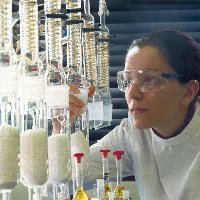Lancaster scientists use butter to track levels of air pollutants

Butter could be the key to tracking levels of air pollution around the world, say researchers from Lancaster University and Greenpeace Research Laboratories.
Professor Kevin Jones from Lancaster's Environmental Science department, says analysing pats of butter from individual farms could be a reliable way of monitoring local production of pollutants such as PCBs, dioxins and pesticides - especially in countries without sophisticated air monitoring technology.
Air pollutants fall on grazing pastures and become concentrated in the fat in cow's milk, which is itself concentrated in butter, explains Professor Jones.
"Almost every country in the world has enough cows to make the butter testing possible, and there are huge areas of the world where no measurements are currently made at all. So testing butter could allow fairly accurate measures to be simply made."
The test could be used to measure the success of a UN programme launched last December to eliminate the production of 12 'persistent organic pollutants' (POPs) from 122 countries worldwide, says the team.
The team analysed more than 60 samples of butter from 23 countries, including the UK, China and Africa. They measured levels of polychlorated biphenyls (PCBs), which are often used as lubricants, and pesticides. Their data closely matched that produced by sophisticated air monitoring centres in some of these countries.
Professor Jones warned that the technique has certain limitations. In some countries, cows are kept inside for several months each year. This would reduce their exposure to air pollutants and produce deceptively low pollution scores.